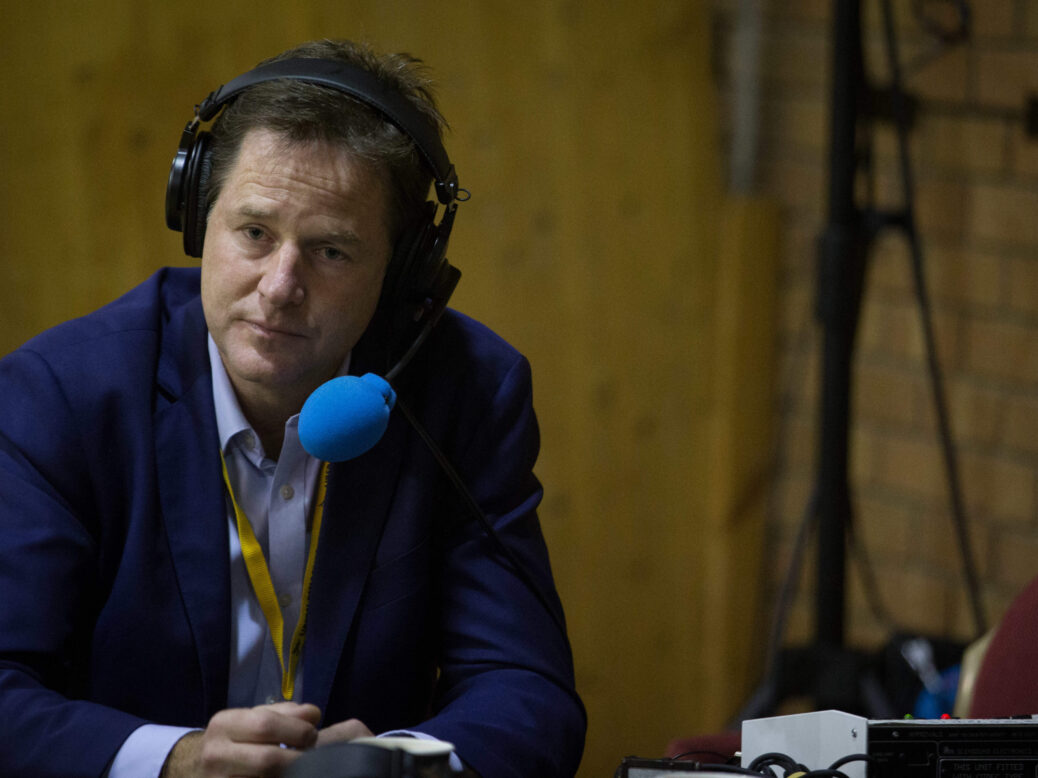
“Rage is the opposite of reason. Discuss!”, Nick Clegg declares jauntily at the start of the first episode of his new podcast, Anger Management. The former Lib Dem leader and deputy prime minister can now be heard on the internet airwaves fortnightly, grilling guests about what he calls “the politics of anger”. Since his show is introduced by a montage of angry politicians shouting, it’s guaranteed to raise the listener’s blood pressure before the host even starts talking.
Clegg is just the latest in a long run of politicians to try their hand at podcasting. Perhaps the most notable example in the UK is the former Labour leader Ed Miliband, whose Reasons to be Cheerful show made in partnership with the former Absolute Radio DJ Geoff Lloyd hit number two in the iTunes podcast chart when it debuted in September 2017 and was recently nominated for a 2018 British Podcast Award. Jacob Rees-Mogg, too, has a fortnightly podcast called the Moggcast, which launched in January 2018 and is hosted by Conservative Home. Where once a politician might do a phone-in show on LBC or guest host The Jeremy Vine Show on BBC Radio 2 to show how in touch and relatable they are (as in Call Clegg, which aired on LBC from 2013 to 2015, or Ed Miliband’s lunch time death metal scream), they can now go it alone.
In his column in the i newspaper introducing the podcast, Clegg puts his finger on exactly why it is that politicians find podcasting so attractive: it’s all about control. “I have grown to abhor the tired and tested confrontational interview format,” he writes. On his podcast, “there is no wish to pounce on a slip of the tongue or endure a soundbite being hammered home”. There’s a freedom to this kind of on-demand internet audio, which can be delivered directly to an audience without having to get past the traditional gatekeepers of broadcasting. There’s no need to put up with John Humphrys or work with the BBC’s requirement for political balance. The politician, usually on the receiving end of whatever the interviewer wants to throw at them, is in charge.
Given this, it’s unfortunate that in his first episode Nick Clegg falls foul of his own edicts. His first guest is former Ukip leader Nigel Farage (coincidentally also the host of a podcast called Farage Against the Machine). It’s a slightly odd choice of guest to launch the show — made, no doubt, to generate controversy and a higher iTunes chart position — and it doesn’t exactly show Clegg’s broadcasting skills in a good light.
In a recorded disclaimer that plays before the interview, the former Lib Dem leader and vocal Remainer tries to pre-empt criticism that he’s giving a platform to someone with pretty unpalatable views. He explains that the first half of the 47-minute episode is meant to be about Farage’s “life, not really me cross-questioning him”, and that to hear them “locking horns more on the issues of the day” listeners must wait until the latter part of the show.
This approach results in Clegg letting Farage get away with a number of fact-light statements early on, and then later adopting the Humphrys-style tactic of repeatedly interrupting Farage before he can finish a point. As an interview style, it’s the worst of both worlds — neither spacious enough to allow the guest to explain their thinking fully, nor robust enough to provide an effective rebuttal. Hosting a podcast is a deceptively hard thing to do. It would take someone substantially more skilled behind the microphone than Clegg to completely reinvent the one-on-one discussion format in a single episode.
The lure of podcasting for politicians is in the way listeners react to the medium. The entire burgeoning podcast advert market is founded on research that points to a strong sense of intimacy between podcast host and audience — it’s a level of loyalty and engagement that surpasses many other forms of media. In politics, that can be harnessed for electoral gain: for instance, Hillary Clinton had a podcast called With Her that ran during her 2016 presidential campaign.
The trouble is that politicians aren’t necessarily that good at making podcasts. They’re not journalists, and they don’t often have a good nose for what makes a strong show for the listener, or take the advice of those who do. For those still in office (or, like Clegg, still wanting to participate in politics despite losing his seat), there are other pressures that can prevent them being completely honest on air. As Amanda Hess pointed out in the New York Times in 2017, the best episodes of Clinton’s podcast were made after she lost the election, when she moved out of campaign mode and just tried to process what had happened like everyone else.
The rise of the podcasting politician is the result of a few different factors: an increased dominance of personality in politics; the tendency for us all to gravitate towards our own “filter bubbles” of reassuring content; and an ever-more polarised media climate. For my money, the best show to come out of this trend so far is Ed Miliband’s. He leans in to the “geeky” stereotype that haunted him for his entire career and, guided by veteran broadcaster Geoff Lloyd, is seeking to make something that looks beyond the political bubble.
Podcasts are at their best when they serve a particular niche interest group: there’s clearly a community of people who enjoy listening to Jacob Rees-Mogg intoning bleakly about obscure areas of policy, and best of luck to them. Politicians should realise that it is not a form that works when you try to appeal to everyone. Otherwise, like Nick Clegg, they will end up telling Nigel Farage that he’s “very good at the high horse stuff about how the EU is ghastly” in a strained tone of voice.






